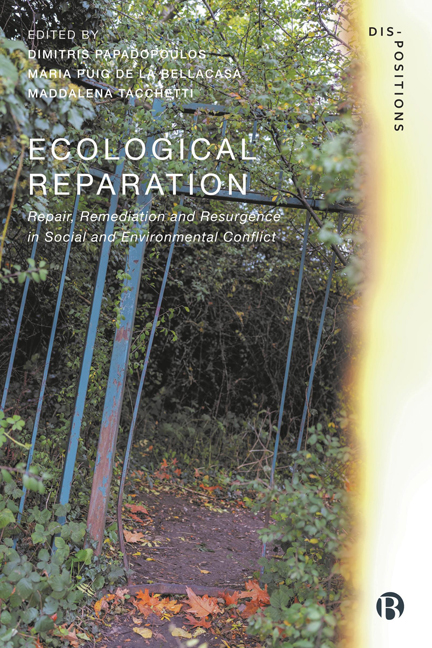Book contents
- Frontmatter
- Contents
- List of Figures
- Notes on Contributors
- Acknowledgements
- Note on the Figures
- Dis-Positions Series Preface
- Introduction: No Justice, No Ecological Peace: The Groundings of Ecological Reparation
- PART I Depletion<>Resurgence
- PART II Deskilling<>Experimenting
- PART III Contaminating<>Cohabiting
- PART IV Enclosing<>Reclaiming Land
- PART V Loss<>Recollecting
- PART VI Representing<>Self-governing
- PART VII Isolating<>Embodying
- PART VIII Growth<>Flourishing
- Index
22 - Cultivating Attention to Fragility: The Sensible Encounters of Maintenance
Published online by Cambridge University Press: 28 March 2024
- Frontmatter
- Contents
- List of Figures
- Notes on Contributors
- Acknowledgements
- Note on the Figures
- Dis-Positions Series Preface
- Introduction: No Justice, No Ecological Peace: The Groundings of Ecological Reparation
- PART I Depletion<>Resurgence
- PART II Deskilling<>Experimenting
- PART III Contaminating<>Cohabiting
- PART IV Enclosing<>Reclaiming Land
- PART V Loss<>Recollecting
- PART VI Representing<>Self-governing
- PART VII Isolating<>Embodying
- PART VIII Growth<>Flourishing
- Index
Summary
Maintenance practices have been an object of growing interest in recent years, and numerous researchers working in a variety of disciplines have made stimulating forays into a vast continent of jobs and ordinary activities which still appears largely unexplored (Jackson, 2016; continent, 2017; Strebel et al, 2019; Denis and Pontille, 2020b). This body of research works has notably played an active role in acknowledging the importance of material ‘reproductive work’ in the constitution of social life, bringing to light the omnipresence of mundane practices dedicated to making things last. Among these ‘maintenance and repair studies’, some have also initiated a fruitful dialogue with feminist theories of care, especially the work of Tronto (1993), whose definition of care, articulated with Fisher, famously refers to ‘everything that we do to maintain, continue and repair our “world” so that we can live in it as well as possible’ (Fisher and Tronto, 1990: 40). Extending the empirical and analytical gesture aimed at ‘surfacing invisible work’ (Star, 1999), this conversation between maintenance and care has made two important contributions to the ways in which social sciences approach the relationship between humans and artefacts. On one hand, it has participated in decentring the traditional focus on stability and persistence towards material fragility and its various manifestation (Denis and Pontille, 2015; Domínguez Rubio, 2020; Henke and Sims, 2020). On the other hand, it has emphasized, and documented, the ethical and affective dimensions of maintenance (Houston and Jackson, 2017; Puig de la Bellacasa, 2017).
In this chapter, we propose to further these reflections by exploring a less known, though complementary, aspect of maintenance: its sensorial dimension. If maintenance is a matter of affect, it is also a matter of attention. Material fragility is indeed anything but a transparent feature. In fact, when it appears obvious to anyone, this generally means that maintenance has failed. Fragility of things is thus something that one needs to become sensible to. Making things last entails cultivating a special relationship with them, keeping careful eyes and hands on their condition, and scrutinizing, even sensing, their transformations. Even though some scholars have highlighted the sensory skills involved in specific maintenance activities (Dant, 2008, 2010; Cállen and Sánchez Criado, 2015), little is known yet on how maintainers concretely become attentive to fragility. What is this attention made of? What does it take? How is fragility experienced? How is it dealt with?
- Type
- Chapter
- Information
- Ecological ReparationRepair, Remediation and Resurgence in Social and Environmental Conflict, pp. 344 - 361Publisher: Bristol University PressPrint publication year: 2023



